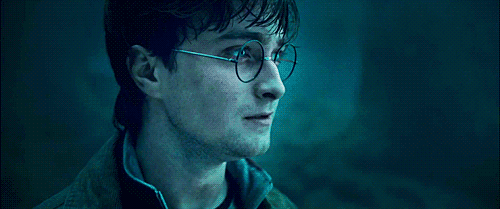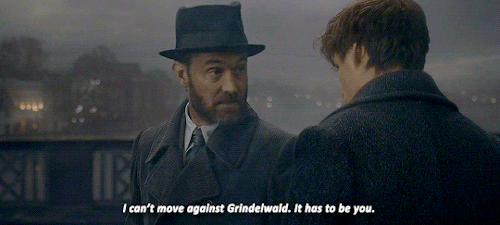“For the Greater Good”: Whose Good Is Greater?
There are three overarching classes into which most villains of fiction and fantasy fall. Some, like Dementors, are evil by nature. Others, like Voldemort, are motivated by pure selfishness. And then there are the villains who see themselves as heroes, as the sole agents of balance, stability, peace, and prosperity – as a kind of chosen one. Gellert Grindelwald seemingly falls into this third, far more interesting category in the upcoming Fantastic Beasts: The Crimes of Grindelwald.
From the Potter series, we know that Grindelwald’s aim is to establish natural wizarding dominance over Muggles “for the greater good” of both populations. By the time we first meet Newt Scamander, those words are well known as Grindelwald’s manifesto.

Though Grindelwald owns the phrase, Newt and his friends also fight for what they perceive as “the greater good.” They also fight for stability and harmony between Muggles and wizards by upholding the law rather than breaking it. What makes Grindelwald such a compelling villain is the unnerving ease with which he shows us that our motivations are not so different from his own. What is it that ultimately separates heroes from villains when they both fight and sacrifice for the same goal? It’s a question that our heroes will have to reckon with as their loyalties are tested in the upcoming film. But another movie – Avengers: Infinity War – may have just given us the answer.

Infinity War’s Thanos justifies his own “mass slaughter for the greater good” with the simple fact that any other solution – thanks to the laws of thermodynamics and population dynamics – would lead to the same fate of universal resource depletion and death. Technically, Thanos is correct, but the Avengers will not stand for his methods all the same. But if their ultimate motivation is also the greater good of the universe and all its life, why shouldn’t they support Thanos in his attempt to provide that good? The answer lies in something Captain America says when Vision offers to sacrifice himself: “We don’t trade lives.” Thanos and Grindelwald alike would sacrifice the nameless and faceless few to preserve the well-being of many; to true heroes, every life is valuable, every casualty unacceptable, every sacrifice personal.
However, as Vision later points out, every hero in Infinity War would sacrifice their own life in a heartbeat to save the world. Leaders good and bad have asked people to fight and sacrifice alongside them. The difference, then, must be that a hero would only willingly trade their own life, while a villain would willingly trade any life but their own. Every hero who faced Thanos’s forces chose to fight and to protect those who did not make that choice, just as Harry chose to walk to Voldemort and just as Newt chose to protect Credence. Thanos and Grindelwald consider themselves too essential to their plots to willingly sacrifice their own lives.

Some characters are decried as being no better than the villains they fight when they willingly trade lives other than their own. What of Dr. Strange, who, in giving up the Time Stone, enabled the death of half the universe? What of Dumbledore, who abandoned Harry to abuse and inevitable death? These characters were asked to choose from a selection of unconscionable options the one that would result in the greatest good. The fact that both deeply feel the pain of those choices and their consequences is what places Dr. Strange and Dumbledore on the side of the heroes. The pain of loss and sacrifice was the final hope for Voldemort’s mutilated soul and may just be the last distinction between good and evil.
Our heroes will have to grapple with these questions before their stories are over. Newt and his friends may ask themselves if Grindelwald really is right, if his violent campaign really is the only way to achieve lasting peace. We will be asked to consider whether there even is a difference between Dumbledore and Grindelwald, to grapple with his role in Grindelwald’s rise and the pain he has caused by turning a blind eye. The pain of loss and sacrifice will factor heavily into both Avengers 4 and the Fantastic Beasts series and may well be what ultimately allows our heroes to triumph for the greater good.



